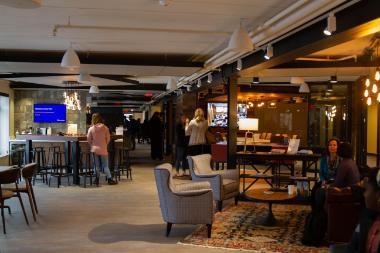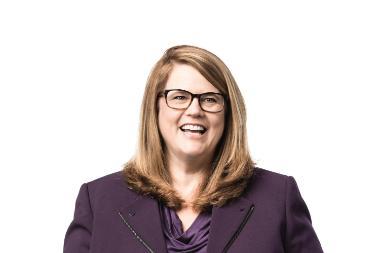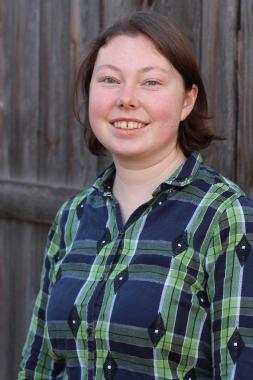June 1, 2020
Wheaton’s career coaches search out the students, not the other way around.
 Even before the COVID-19 pandemic sent many employees to work from home, career coach Olivia Zimmerman Lorimer ’11 was often out of the office.
Even before the COVID-19 pandemic sent many employees to work from home, career coach Olivia Zimmerman Lorimer ’11 was often out of the office.
Despite an open, light-filled, minimalist space in Wheaton College’s recently remodeled Center for Vocation and Career, she was only there about half of the time.
By design, Lorimer—and the other four career coaches at the CVC—spend 51 percent of the workweek in the CVC studio. The other 49 percent is spent “embedded” in specific academic departments—holding regular office hours for one-on-one career coaching with students, giving presentations and workshops about the CVC’s services, researching information about prospective internships and employers, and partnering with faculty to make sure students have opportunities to plan for life after college.
Embedding the coaches in academic departments means that students who might not seek out the CVC office at their own initiative find that the CVC comes to them. "Putting the coaches where the students are is really important," said CVC Director Dee Pierce M.A. ’17. "They see coaches when they’re going to or from class or departmental activities, rather than thinking 'There’s a career office somewhere that I need to go find.' That makes it personal."
Lorimer is the coach for the STEM departments: Applied Health Science, Biology, Chemistry, Computer Science, Environmental Science, Geology, Liberal Arts Engineering, Mathematics and Physics. Lorimer, whose Wheaton degree is in Communication, also coaches students in that major.
An average day in the CVC is fast-paced as team members prep for events like the Canvas series, Taco Tuesdays, Networking Night, and Externship Day while sending weekly, major-specific resource e-mails to students and faculty or meeting with students who drop by.
Lorimer said the mid-semester pivot to providing services online meant the pace accelerated as the CVC team quickly developed a new suite of events and resources, including a webinar series geared toward 2020 graduates, many of whom are currently launching their job searches amid a global pandemic economy. The staff continues to coach current students and recent graduates virtually via Zoom.
Whether in person or remotely, the goal is the same: to make career preparation a routine part of life for every student at Wheaton College.
"I see my role as helping students understand and articulate where they’re going to go after graduation," Lorimer said. "I want to be a warm, approachable resource for them."
A Strategy Tailored to Wheaton Students
 Although many colleges have career coaches, Wheaton’s approach is distinctive, Pierce said. While other colleges typically assign coaches to students based on an industry or planned job, Wheaton instead connects students with a coach physically located in their academic department.
Although many colleges have career coaches, Wheaton’s approach is distinctive, Pierce said. While other colleges typically assign coaches to students based on an industry or planned job, Wheaton instead connects students with a coach physically located in their academic department.
"The reality is that as a liberal arts student, you can do lots of different things, and you may not know exactly what that’s going to be until you’ve had a couple of internships or gotten through a lot of your coursework," Pierce said. "We’ve made it the coach’s job to translate the liberal arts experience into an industry, rather than expecting a student to be able to choose an industry out of the gate."
Coaches are also on hand as a resource to faculty members. A professor can wave a coach into her office to assist with an advising conversation or invite the coach to regularly discuss career opportunities during a class.
Wheaton’s strategy also offers students a specialized career development experience. For example, not only does Lorimer provide career resources generally for Wheaton’s STEM majors, but she’s also able to equip students with field-specific advice. Physics professor and department chair Dr. Darren Craig said that’s important because fields that seem as similar as physics and engineering have very different career trajectories.
"Engineering is one of those degrees where you go into the workplace and find lots of jobs that are looking for that specific degree—there’s kind of an easy path from degree to job, and it’s almost automatic," Craig said. "For physics, you need to market the degree—to be able to know what kinds of skills are transferable, and how to talk about that and represent it on your resume."
The strategy has led to strong partnerships between academic departments and the CVC, with some coaches even becoming a cherished part of social life in their departments, judging baking contests or organizing events in response to specific needs. "There’s been this organic wonderfulness around engagement with our office," Pierce said, "because coaches are present, and they’re known."
"Ultimately, We’re Educators"
-253x380.jpeg) A good career coach has strong interpersonal skills, relates well to students, and helps them understand the connection between their skills and interests and a role in the marketplace.
A good career coach has strong interpersonal skills, relates well to students, and helps them understand the connection between their skills and interests and a role in the marketplace.
Lorimer is currently working with an Applied Health Science major who has stopped by during her drop-in hours, checked in between classes, and continued to interact with the CVC online.
"She’s thinking through questions like: 'Do I connect more with the relational or academic side of this field?'" Lorimer said. "That leads to next steps, like either pursuing a career as an M.D. or a physician’s assistant, or perhaps a Master of Public Health."
While the CVC’s framework is designed to gradually guide students through a period of broad exploration as first-year students to a specific path post-graduation, coaches tailor their advice to assist individual students based on where they are in their career. An anxious senior who has delayed coming to the CVC can get help, as can a student in his first semester on campus.
Lorimer said that students often need help reframing the process in ways that give them the freedom to explore. "Sometimes as Christians, we think of the will of God as a bulls-eye. 'There’s one plan that God has for my life and I have to discover that, and if I miss it then I’ve missed the mark,'" she said. "We encourage students to think of your life like a canvas. There are clear boundaries, but we’re given a lot of freedom to paint."
If a student feels like there are too many options, Lorimer said, “We talk with them and say, 'Let’s start to filter this down. What are the skills that God has given you? What are the classes that resonate with you or the topics that you engage with?' We facilitate that kind of self-reflective work."
The goal is to help students develop skills they can use at various points throughout their careers. "It’s a framework and a set of resources where, if you decide to pivot five years out or 10 years out, you have the tools to go through that process again," she said.
Effective coaches strike the right balance between helping students think about possibilities and nudging them to take the steps that help them advance the process.
"You can’t be afraid to push students," Pierce said. "Ultimately, we’re educators—we’re trying to teach students how to do this thing. Sometimes that means saying, 'You've done a lot of research. You've collected a lot of information. It's time to start applying!'"
Lorimer typically ends each appointment by guiding a student to come up with three to five action steps. That might mean taking a career explorer assessment, working on a section of the CVC’s myStory curriculum, developing a LinkedIn profile, networking with an alumnus, or filling out an application.
Wheaton’s 99 percent landed rate—the percentage of 2019 graduates who found jobs or internships, were accepted into graduate school, or began pursuing another adventure of their choice within six months of graduation—is evidence the strategy works.
"Wheaton students are brilliant, and they’re well-equipped," Lorimer said. "It’s really exciting to get to be alongside for this season of their lives."
An Approach That Works
 Rachel Barron ’21 is one of many Wheaton students who have seen results from the CVC’s approach.
Rachel Barron ’21 is one of many Wheaton students who have seen results from the CVC’s approach.
This summer, Barron, who is studying physics and math, starts an internship in the cybersecurity department at the global health technology company Abbott Laboratories, where she will be working on disaster relief and recovery.
The internship is a major step toward Barron’s goal of becoming a chief information officer with a focus on information security and cybersecurity.
As a first-year student, Barron considered majoring in Christian Formation and Ministry or Applied Health Science before realizing that physics--her favorite subject in high school--could lead to a career path. She began working with her coach on a resume to help her find odd jobs.
Barron said that knowing about the CVC, even before she knew exactly what she wanted to study, helped her keep her career development in mind.
"Because my coach was in the department and around the area, I was able to start talking to her and realized what tools the CVC has—even though, as a freshman, I didn’t know where the career office was," she said. "It’s been easier to keep those career thoughts going as I’ve figured out classes and everything else, instead of letting them get lost."
Later that year, when she decided to apply to labs that offered undergraduate research experiences, her coach helped her refocus her resume. Around that time, a conversation she had with a physicist she met at a conference helped Barron to realize that she wanted to work in the industry, rather than pursuing an academic career. "Learning that an academic career wasn’t quite what I was looking for was a starting point in my trajectory," she said.
At the CVC’s annual Declaration Dinner, where sophomores declare their chosen major, Barron connected with an alumnus in the cybersecurity field, who offered her advice on seeking an internship and introduced her to other Wheaton alumni to network with.
This past year, Barron collaborated with Lorimer to find the right internship for her goals. "Cybersecurity is a very wide field, so it was important to think about what part of cybersecurity I’m interested in," Barron said.
"Olivia helped me search, and helped me understand the right keywords to look for. She also helped me to leverage Wheaton’s LinkedIn network and connect with alumni and talk to them," Barron added. "I’ve had some really good conversations with people."
Those conversations, and guidance from Lorimer, helped her choose between two promising cybersecurity internships: one with an emphasis on sales, and the role at Abbott, which will help her develop the technical skills she seeks.
"Without the support of the CVC, I wouldn’t have this internship. I would definitely still be in the stage of trying to figure out how to access the field, and I would have a lot more uncertainty about what I was going to do after graduation," Barron said. "It would probably take me two or three times as long to get where I am." –LaTonya Taylor